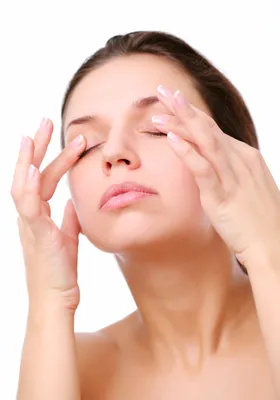Many people seem to have 20/20 vision during the day, which is of course ideal. However, for some, when the sun goes down their grip tightens a bit on the steering wheel, or they avoid driving at all after dusk.
There is actually a medical term for poor sight at night – it’s called nyctalopia (night blindness), and it’s usually an underlying sign of another eye problem, according to Cleveland Clinic. There can be a number of ways to address this issue, from switching up medications to adding more vitamins into your diet. Take a look at these seven tips…
1. Try an Eye Massage
You’ve probably thought about getting a back massage, but what about an eye massage? Luckily, this is something you can do yourself, and it can increase your ability to see in the dark, according to BelMarraHealth.com.
The source suggests closing your eyes tightly and applying a bit of pressure on both eyes with the fleshy part of your palms. “After about five or 10 seconds, instead of seeing black, your vision will turn white momentarily,” explains the site. Wait for the white to go away before opening your eyes, and presto! Apparently you’ll be able to see “significantly” better under the moon.
2. Get Good Sunglasses
ImproveEyesightHQ.com explains that owning a pair of sunglasses is key to helping you improve your night vision. “Just 10 consecutive days of unfiltered sunlight exposure can cause you 50% loss in night vision,” explains the source.
At the same time, your eyes need some light to function properly, it adds. The source suggests buying sunglasses that “reduce light in the entire visible spectrum,” but let in 15 per cent of visible light at most. Also ensure your glasses eliminate UV (invisible) light from reaching your eyes.
3. Be Like a Pirate
No, you’re not dressing up for Halloween, you’re actually improving your night vision acuity. Lifehack.org suggests using the “pirate” technique for seeing in the dark without as much adjustment time.
When you’re suddenly going from a light area into a dark area, keep one eye closed (no actual patch needed) and the other remaining open. “This will allow you to retain night vision in the closed eye,” it notes. Folklore says pirates used the patch so the covered eye could be used for night navigation.
4. Avoid Direct Eye Contact with Light Sources
This one can be a bit of a challenge if you have headlights coming at you constantly from the other direction, but WikiHow says you shouldn’t look right at a light source if you don’t want to be blinded at night.
A strong light source will close down the size of your pupil like the aperture of a camera when conditions are very bright, according to the source. When you stare at a light bulb or another light source, it takes your eye longer to open the pupil and let more light in for the darker conditions. Try averting your gaze slightly on the road at night (without limiting your field of view).
5. Let Your Eyes Adjust Naturally
If you need to drive at night or take a walk somewhere that you’re not all that familiar with, you need all the night vision help you can get. RebuildYourVision.com suggests doing it the natural way (assuming you have time for this method).
You’ll need a dark room and about 20-minutes, it says. Sit there (with eyes open) in the dark room before heading out. “You’ll feel like a cat when you’re done,” it notes. Military personnel apparently use this technique, so it probably works. If you don’t have time, use a sleep mask for a few minutes to help your eyes adjust, it adds.
6. Make Your Diet Eye-Friendly
If you’re having trouble seeing well at night, it could be a matter of not getting enough of the vitamins and nutrients the eye needs most, notes Arizona Eye Specialists. One particularly important vitamin is Vitamin A, which contains rhodopsin, “a light-absorbing protein in the retina,” according to the source.
You can get lots of Vitamin A without supplements by eating dark leafy veggies, carrots, potatoes, and tomatoes, it suggests. You can also find it in dairy products and fish. Oysters and shellfish are apparently good sources of zinc, which works “hand-in-hand” with Vitamin A and can help further prevent poor night vision, it adds.
7. Talk to a Doctor
It turns out that even medications designed to treat glaucoma, a progressive eye disease, can lead to problems seeing at night. Some glaucoma medications work by constricting the pupil, letting in less light to the retina, notes Cleveland Clinic.
An eye doctor may also be able to find other causes of your night blindness – for example, you may need a stronger prescription for your glasses (if you’re near-sighted), and it can also be a sign of cataracts, a cloudiness of the eye’s lens. There’s another condition called retinitis pigmentosa (affecting how the retina responds to light) that could be the culprit, according to the source.










